There are many postcards on the Internet from old Aden under British control. This continues the series with more general views of Aden.
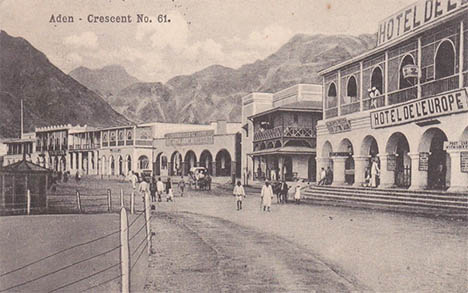
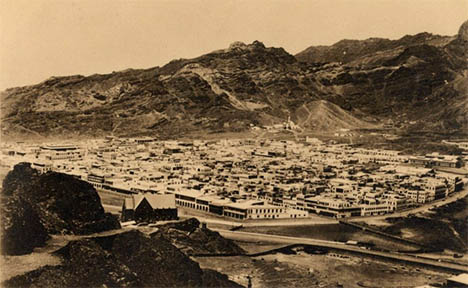
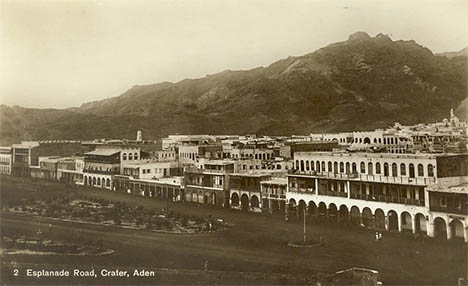
to be continued… for #13, click here.
There are many postcards on the Internet from old Aden under British control. This continues the series with more general views of Aden.



to be continued… for #13, click here.
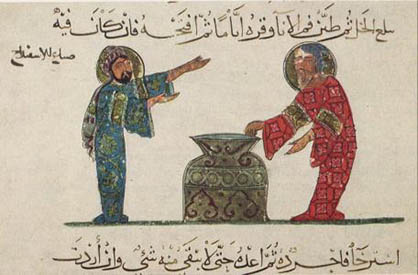
by Edward E. Curtis IV, Religion Bulletin, May 2, 2014
Editor’s note: This post is part of the Reflections on Islamic Studies series.
By any measure, Islamic studies is a vibrant field. In the last several decades, the number of tenure-track positions dedicated to the study of Islam as a religion and to Muslim politics and societies has expanded. New journals have appeared; book sales are good; and interest in Islamic studies has led to important public humanities projects such as the National Endowment for the Humanities’ Muslim Journeys Bookshelf.
What makes Islamic studies so dynamic? For one, its ever-expanding body of participants, who come from a number of disciplinary perspectives. The field is populated by intellectual networks rather than one identifiable set of intellectual authorities. Islamic studies finds institutional homes not only in religious studies and Near Eastern languages departments, but also in history, anthropology, sociology, political science, ethnomusicology, and art and architecture, among other academic units.
Islamic studies attracts some of the very best scholars in the world. There are now so many scholars producing so much scholarship that it is impossible for one person to know all of the literature in this vast field. Questions about where to do a graduate degree must be followed by the question of what the applicant wishes to study.
The multi-disciplinary study of Islam nurtures ever-expanding circles of conversation about the significance of Islam to both specialized disciplinary concerns and interdisciplinary inquiry. The origins of Islamic studies may be found in orientalism, that is, the scholarly, philological study of Islamic religion and Muslim cultures. But today, Islamic studies is a field defined by shared and intersecting questions, themes, and data, not any one methodology or set of texts. Its practitioners are not tied together by any one canon—one needn’t be an expert on the Qur’an to be in Islamic studies. Continue reading Ode to Islamic Studies: Its Allure, Its Danger, Its Power
[The Wellcome Trust is generously funding a joint University of Oxford/University of Warwick publishing project online of an important 13th century medical text. Read about it below and on their website.]
KitÄb Ê¿UyÅ«n al-anbÄʾ fÄ« á¹abaqÄt al-aá¹ibbÄʾ
كتاب عيون الأنباء ÙÙŠ طبقات الأطباء
In the mid-13th century, a practising physician in Syria named Ibn AbÄ« Uá¹£aybiÊ¿ah set himself the task of recording the history of medicine throughout the known world. His book The Best Accounts of the Classes of Physicians covers 1700 years of medical practice, from the mythological beginnings of medicine with Asclepius through Greece, Rome, and India, down to the author’s day. Written as much to entertain as to inform, it is not only the earliest comprehensive history of medicine but the most important and ambitious of the medieval period, incorporating accounts of over 442 physicians, their training, practice, and medical compositions, all interlaced with amusing poetry and anecdotes illustrating their life and character. The ‘Herodotean’ breadth of the book reflects the geographical and cultural reach of the Islamic empire. Written by a man who was a medic and a poet, this highly readable history reflects considerable medical experience and lies at the interface of the serious medical practice of the day with society’s interest in biography and gossip.
The Wellcome Trust is generously funding a joint University of Oxford/University of Warwick project that will make this remarkable historical source available for the first time in a reliable and readable translation and study, as well as a critical edition of the text itself, resulting in a step-change in our knowledge of medical history in Medieval Islam. For nearly 300 years attempts to translate this monumental work have failed owing to the extraordinary range of skills needed to tackle it. This joint project is the first to assemble a team of senior and junior scholars with the required skills and interests to make it happen.
As work proceeds during the three- and one-half-year project, samples of biographical entries will be placed on this web page, with an opportunity provided for general discussion and comment.
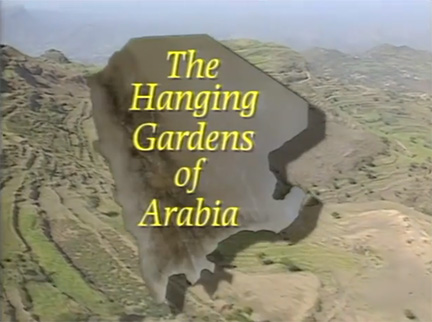
Here is a Youtube trailer for an environmental documentary film about Yemen, produced by Tony Milroy of Arid Lands and Sustainable Communities Trust for the Channel 4 series ‘Fragile Earth’.
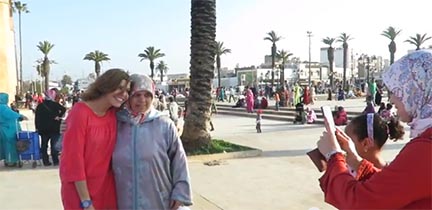
by Anouar Majid, Tingiata, April 15, 2014
The most controversial actress in Morocco and the Arab world gave me a tour of Rabat, the capital of Morocco. To say that it was a unique experience would, quite frankly, be a huge understatement. Parking attendants, men in uniform, women with hijabs and jellabas, food sellers and everyone—literally—who saw Latefa greeted her with smiles and affection. People took photographs with her and asked for new performances. She is truly a people’s artist, one who uses a container (labelled “cont’n’artâ€), among other tools, to foster awareness about health and difficult social issues.
The car ride, as you could see in the video, was, in itself, a fascinating spectacle. The free-spirited Latefa sang throughout most of trip, ending, most appropriately, with the theme of Carmen, reminding us that women are born to be free, not objects to be hidden away.

Russell Brand on The Sun
The British tabloid, The Sun, which once showed Saddam Hussein in his underwear on its cover, has now taken on the chain Pizza Express for serving halal chicken. The humor of Monty Python lives on in the Fleet Street media. The apparent argument of the article is that slitting the throat of a chicken while it is still alive is cruel punishment. I suspect that the writers of The Sun have a dark motive rather than calling for a campaign to have chickens slaughtered with dignity after being stun gunned. If such a contrived story merits more attention than the ongoing slaughter of humans in many parts of the world, then they seem to be taking a cue from “Fowlty” Towers. I suspect that The Sun does not have an equal disdain of the common practice of raising poultry in such close quarters that they basically eat their own excrement, although excrement is surely an apt topic for this tabloid.
The Sun finds Islam to be a convenient target, failing to have equal animosity to Jewish kosher law, which mandates the same style of slaughter only with a different prayer. And the slitting of the throat is actually said to be a humane way of ending the life of an animal bred to be eaten. True to its name, this halal henpicking is tabloid nonsense, void of any semblance of rationality. Most people no doubt see such a story as funny, but there are enough people out there to use this kind of silly blather to reinforce their own hate of Muslims (and Jews, of course). And then there are those who respond with humor, as does the British comedian Russell Brand on Youtube. So perhaps we need to tell yet another version of the old joke: Why did the chicken cross the road? Just for the halal of it…

Here is a snap question: which does more harm to the image of Muslims, especially in the Western media: the political maneuvering of Egypt’s now outlawed “Muslim Brotherhood” or the savage acts committed by the self-styled Boko Haram in Nigeria? Boko Haram is well named, if you remove the Boko. I would have a hard time thinking of a more bloodthirsty and irrational group calling themselves Muslims, and there are far too many examples to choose from historically. Their kidnapping of some 276 Nigerian girls from a school to essentially enslave them is bad enough, but reports now surface of an indiscriminate killing spree in a crowded Nigerian market with over 300 said to be dead. The death toll from this group is measured in the thousands, both Christians and fellow Muslims becoming victims. Boko Haram espouses such a distorted view of Islam, that it is more accurate to label them a political terrorist group using the umbrella of Islam to carry out their barbaric acts.
Boko Haram is not alone. It is this kind of volatile mix of politics and religion that has plagued human history, probably from the start of recorded history. If one steps out of the Western preoccupation with the biblical tradition, the idea that any kind of just God would tell his ragged followers to kill every man, woman, child, ox, sheep and ass in a Canaanite city is a clear attempt to justify what most of us would rightly see today as a violation of human rights. The crusades and the bloody wars in Europe between Protestants and Catholics turned religion into yet another excuse to justify killing others. Hindus and Buddhists also have their blood-soaked moments, as do most known religions. The point is that “religion” is never separate from the real world except in some imaginary. It is myth that drives belief, whether from a sacred text written in a shroud of mystery or the quotidian alibi of personal experience. Those who take on the mantle of “God” show how little faith they really have. Continue reading The Haram of Boko Haram
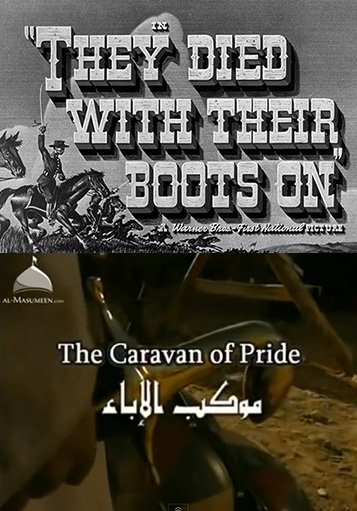
When I was young and impressionable, one of my favorite movies was They Died with their Boots On, the Errol Flynn movie about Custer’s last stand. There was Flynn/Custer with his sword raised out in front of his troops heading for the savage Indians. Had it been a fair fight, of course he would have won, but he stood his ground and was the last man standing. Watching this film recently, apart from the totally ahistorical plot of the made-for-Hollywood battle scene, I wonder how many horses were maimed from the trip wires. In a sense Flynn represented a hero against impossible odds, but in another it perpetuated the notion of the white man’s manifest destiny at the expense of the savage “red man.” I doubt it inspired any sarsparilla party types to go out and shoot any Indians, but it certainly reinforced a cultural bias that remains to this day.
I recently came across a film about the death of Husayn, the Prophet Muhammad’s grandson, at Karbala. This comes in Arabic and Urdu versions and is entitled “The Caravan of Pride” (موكب الاباء). Like the Flynn film, the bias in the film is evident from the start. This is a film highlighting the conservative Shi’a view of an evil and crazed Yazid. Watching the film creates sympathy for the tragic death of Husayn and his followers at the same time that it denigrates the incoming Umayyad caliphs as heretics. It is easy to forget that the event taking place happened in 61 AH/680 CE, before there were any of the Sunni law schools and five years before Abd al-Malik became caliph and authorized a new edition of the Qur’an. Continue reading They died with their sandals on